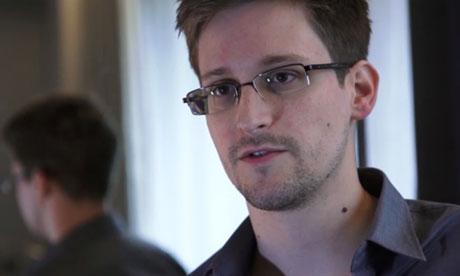NSA whistleblower reveals himself, hopes for safety in Hong Kong
Edward Snowden says he’s the source behind leaks about the U.S. PRISM surveillance program and the collection of phone metadata. (Photo courtesy of The Guardian.)
Edward Snowden calls himself a “whistleblower”. Others call him a hero. But as the source responsible for leaking a FISA court order mandating Verizon to turn over all metadata on its phone records, the United States government is most likely to call him a criminal.
Though his punishment is likely to be severe, Snowden maintains that he had a duty to make this information public.
“I think that the public is owed an explanation of the motivations behind the people who make these disclosures that are outside of the democratic model,” Snowden said in a 12-minute interview with the Guardian that has thrust him into the worldwide spotlight.
The 29-year old previously worked as a CIA computer technician and most recently, a low-ranking employee at Booz Allen Hamilton, a large government contractor. Snowden calls himself a “regular guy” without any special skills who had access to many important secrets of the United States government including the locations of CIA stations overseas and the identities of undercover officers.
He is currently hiding out in a Hong Kong hotel, his exact location presently unknown.
Hong Kong, an autonomous offshoot of China, has struck some, including Evan Osnos, staff writer for the New Yorker, as an odd choice for refuge, given China’s history of tight control of the Internet and censorship of its dissidents. China employs 25,000 to 50,000 Internet police and is quick to shut down any content creator who does not operate within the government’s censorship laws — though residents of Hong Kong enjoy considerably more freedom.
Snowden said he selected Hong Kong for its commitment to free speech and history of political dissent. The country does have control of its internal affairs, though Beijing controls issues of foreign affairs and national security. There is also a precedent of people being forced to leave Hong Kong — the nation signed an extradition treaty with the United States in 1996. Though both countries have the right to refuse extradition requests, Hong Kong has little incentive to keep Snowden against the will of the United States.
“In some ways, he has chosen a fairly risky place to go,” Osnos said.
The Chinese government now has to choose the role it wants to play in this episode, Osnos said. If it does nothing, Snowden would be subject to the normal extradition process. Should Beijing intervene, he could find himself back in the United States sooner. President Barack Obama and Chinese President Xi Jinping recently completed a two-day summit where they discussed, among other issues, cyber-security.
The White House hasn’t announced its plans regarding Snowden, though spokesman Jay Carney said an investigation into the leak had begun. He declined to address the issue of Snowden specifically.
Every day, reporters and producers at The World are hard at work bringing you human-centered news from across the globe. But we can’t do it without you. We need your support to ensure we can continue this work for another year.
Make a gift today, and you’ll help us unlock a matching gift of $67,000!
